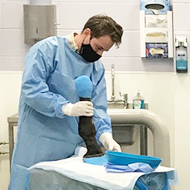
In-person CPD courses will run alongside digital lessons
BEVA’s popular CPD courses are set to resume this month, with face-to-face lessons running alongside digital learning.
After more than a year of COVID-enforced online CPD, members and non-members will soon be able to take advantage of a wide array of hands-on, in-person courses, including the BEVA fundamentals series.
Together with the practical learning, there will also be a series of online courses with new content being added regularly.
A BEVA spokesperson said: "Strict COVID safety precautions are in force for each course; pre-course lateral flow tests are compulsory for all attendees, numbers are strictly limited, facemasks are required and hand sanitation sites are available."
A list of the available courses is below. For more information and to sign up, visit beva.org.uk/CPD1
Upcoming practical courses
- fundamentals of lameness, laminitis and farriery, 20 May
- fundamentals of radiography and ultrasound 6 June
- BEVA Approved: BARTA veterinary responder course, 14 June
- pre-purchase examination – the essentials, 6 July
- the equine back, 10 July
- fundamentals of the skin, eyes, medicines and difficult moments, 21 July
- fundamentals of sedation, field anaesthesia and castration, 15 September
- event incident management, 30 September
- fundamentals of equine emergencies, 6 October
- pre-purchase examination – the essentials, 18 October
- foot and farriery, 8 November
- fundamentals of gastroenterology, 11 November
- interactive cardiology workshop, 11 November
- fundamentals of dentistry, 20 November
- dentistry – the next steps, 21 November
- equine ophthalmology, 29 November.
- from superfoods to supplements: how to know more than the owner, 7 July
- advanced theoretical equine dental technicians course, 19 August
- advanced theoretical equine dental technicians course – online discussion only in preparation for the BEVA/BVDA examination, 19 August
- advanced imaging discussion forum, 14 October
- advanced reproduction discussion forum, 1 December.



 The Animal and Plant Health Agency (APHA) has updated its online reporting service for dead wild birds.
The Animal and Plant Health Agency (APHA) has updated its online reporting service for dead wild birds.